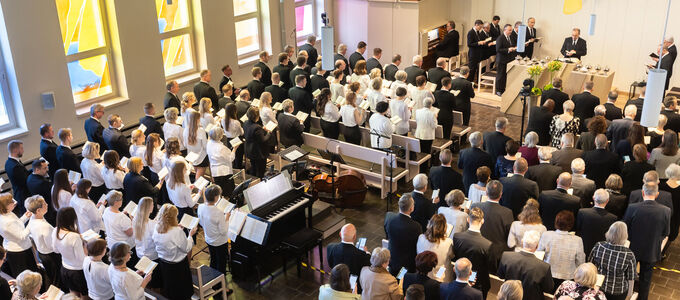
A sinner finds grace before God, a devout man does not. Does that mean that keeping the commandments is unimportant? No, there is more to this than meets the eye. What exactly this is, Chief Apostle Jean-Luc Schneider explained in a divine service.
“Also He spoke this parable to some who trusted in themselves that they were righteous, and despised others.” These words introduced a Bible reading in our church in Hildesheim, Germany, on 25 February 2024. The Bible text for the divine service was Luke 18: 13: “And the tax collector, standing afar off, would not so much as raise his eyes to heaven, but beat his breast, saying, ‘God, be merciful to me a sinner!’” But Chief Apostle Jean-Luc Schneider read out the whole story to remind everyone of it.
A look into the time of Jesus
The parable talks about two different people. “The Pharisee was not a bad person,” the Chief Apostle pointed out. Pharisees were very devout and strictly followed the law. “This man was even aware that he could not take credit for this, but thanked God that he was able to do this.”
The other person was a tax collector. “Tax collectors were absolutely despised,” the Chief Apostle said. They were considered unclean because they worked for the Romans. On top of that, most of them were corrupt and cheated people.
“And yet the tax collector was granted grace, but not the Pharisee,” the Chief Apostle said.
“On the surface, one could say that it doesn’t matter whether one keeps the law or not. The main thing is that one repents and is humble. Then one will find grace.” But that was not what Jesus wanted to say. He had not come to destroy the Law, but to fulfil it (Matthew 5: 17). “Jesus wanted to show that the Law was not just prescriptions, sacrifice, and conduct. The purpose of the law was to teach the people to love their neighbour.” And: “Even if you did everything that was prescribed, you still could not attain salvation; you absolutely needed grace. Without grace you cannot be saved.”
A step into the present
For Christians today, the parable shows how we should behave towards God and how we should pray to Him. The key here is humbleness. To be humble means
- to be aware of one’s dependence on the Creator: “We must keep the law, we must work, do our best, and behave ourselves well. Yet we must not forget that even if we do everything we should and can, our work, our accomplishments, and our conduct do not actually entitle us to all the things we want. This is proven by the fact that there are many people who do more than you and I do, who are better than me, and who do not have what I have. Everything we have we owe to grace.”
- to adopt the right attitude before God. The point is not to disparage ourselves. Rather, Jesus Christ reveals the true nature of God to us. “And then I look at myself and realise: I am anything but perfect. I cannot enter the kingdom of God like this, I do not fit in. Everything is perfect there.” Jesus Christ too.
- to believe in God’s perfection. “God is the greatest. He knows more, He can do more, He understands everything, He knows everything. He is love and His love is perfect. Therefore I trust Him. I accept His actions and His will, without resistance, without objections, even if I do not understand what He is doing.”
- to be obedient. “Everyone has their own idea of how they can please God. When we look at the will of God, we are inclined to pick out what suits us.” Some people even invent their own rules to please God. “But obedience means modelling our lives on the gospel of Jesus Christ, which the Apostles teach us.”
- to be willing to learn. “The humble call themselves into question and know: I have to do better here and now.”
- to love your neighbour. “We pray for our fellow human beings. Let us pray in a humble manner, not like the Pharisee who looked down on others, judged them, and despised them. Let us simply accept them as they are and come to God and say: ‘Please be as merciful to him or her as you are to me.’”
- to humbly pray for your neighbour. “Let us not dictate anything to God. We trust in God and rely on His omnipotence, His wisdom, and His love. Dear brothers and sisters, we cannot assume that our love for others is greater than God’s love for them. He knows better than I what serves for their salvation, what they need, and when and how they can attain salvation.”
Humble even in the beyond
Chief Apostle Schneider also referred to the divine service for the departed, which was to take place the week after. The departed are also aware of God’s creative power and that they are dependent on Him. “If the souls in the beyond have this humble attitude towards God and do what He tells them, they can find salvation on Sunday and receive the sacraments.”
























